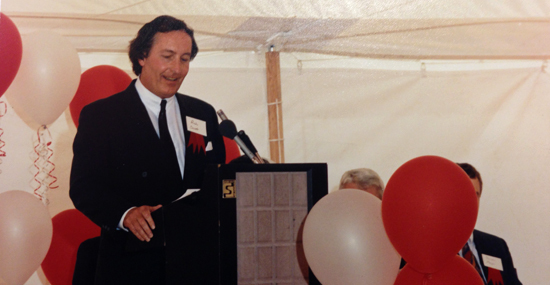
Rich Scott takes a lot of satisfaction in the success of SDN Communications, which is celebrating its 25th anniversary.
Scott was the first chief executive officer of the South Dakota Network, which today does business as SDN Communications. He also was the first CEO of Express Communications, an affiliated telecommunications company that still exists within SDN.
“SDN Communications is now, as it should be, a hugely successful, robust business, and one of the most significant South Dakota corporations,” says Scott, who is retired and lives in Tellico Village, Tenn.
The independent phone companies that formed the early core of SDN began connecting networks in 1989 to offer better long-distance services. Scott came on board in September 1991, after the start-up venture had been started.
In 1992, SDN opened an office in Sioux Falls with nine employees. Today, the growing company has 180 employees and operates from a three-building campus on West 10th Street.
In the 1990s, the telecommunications industry was still adjusting to the national breakup of the monopolistic Bell System – a process that was mandated in legal action in 1982 and took effect in 1984.
“Suddenly, independent telephone companies throughout the United States were, in essence, cut loose from their decades-long, hand-in-glove relationship with the old Bell System,” recalls Scott, who was a veteran of the telecommunications industry before coming to Sioux Falls. He had worked in telecommunications for about 20 years, mostly for Northwestern Bell in Omaha.
Beginning in the 1980s, federal deregulation prompted the creation of new, more localized business models.
“Independents could no longer count on the financial compacts that had existed and had worked so comfortably. Thus, the independents found themselves needing to become masters of their own fate,” Scott says. “New sources of revenue had to be found to replace the former Bell System/independent company revenue sharing.”
In Iowa, to the dismay of regional Bell executives, a consortium of independent phone companies interconnected their networks and started selling long-distance and special-access services, Scott says. The “daring experiment” was copied in other states, including South Dakota and Minnesota, he says.
SDN initially built out its network to the Missouri River by contracting with local exchange companies. By the mid-1990s, the network extended across the state.
Meanwhile, SDN also played a key role in creating a consortium of networks in other states, Scott says. By 2000, SDN could offer connections to 21 states. Services such as Internet and video also had become available and were changing the market.
An internal subplot in the growth of SDN was the conflicting strategies favored by the two boards and a consulting firm that assisted them, Scott says.
He attributes the survival of the company largely to the courage and vision of three men: the late Lanny Johnston, who was the third president of the Express board; Darrell Henderson, the second president of the SDN board; and Kevin Doyle, the company’s CPA.
Scott hired Mark Shlanta, SDN’s current CEO. Shlanta started with SDN in 1998 as network planning and operations director and was promoted to chief executive officer in 2000. He took over when Scott retired.
“I think he’s done a heck of a job,” Scott says.
As CEO, Shlanta has continued efforts to expand SDN’s network in South Dakota and into neighboring states. He also has increased business and institutional access to broadband connectivity and related services.
He also spearheaded the company’s development of a data center and colocation facility northwest of Sioux Falls.
Scott, meanwhile, resides in a retirement village near Knoxville, Tenn. He plays golf and runs house-checking business on the side.
“I am very grateful for the opportunity to have worked for SDN/Express, and it is personally very rewarding to see the company realizing its potential,” he says.
Today, SDN’s 17 owner companies, which are known within as members, serve 80 percent of South Dakota’s geography. They provide local customer bases with services with a variety of phone, TV and security services.
SDN, meanwhile, serves businesses and government institutions with Internet and inter-office connectivity. SDN also offers products such as phone systems and equipment such as servers, firewalls and routers.
The company also provides services to help clients monitor, protect, manage and maintain their networks and telecommunications equipment.



